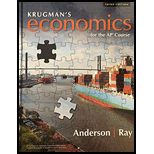
a)
The definition of the marginal
a)
Explanation of Solution
The term "marginal social cost of pollution" refers to the additional expense placed on society whenever an individual or business produces an additional unit of pollution, for as when a person uses polluting fuels and inflicts pollution on the environment.
Introduction: Externality problems such as pollution refer to the fundamental economic policy problems while firms do not internalize the indirect costs or indirect benefits from any of their economic transactions in the market. The quantity where all the costs and benefits are accounted for is called socially optimal quantity.
b)
The definition of the marginal social benefit of pollution and the reasons why polluting more can provide benefits to a firm even when it produces the same quantity or output of products without polluting much
b)
Explanation of Solution
The term "marginal social benefit of pollution" refers to the additional gain or benefit that the society experiences when an additional unit of pollution is produced by a person or a business, for as when the emission of polluting fuel enables the society to purchase goods at a reduced price.
And even if a company produces the same amount of goods with less pollution, polluting more can still be advantageous because the company can employ other anti-pollution tools to lower the level of pollution in the environment. For instance, a company might purchase and install a costly piece of machinery or equipment to eliminate the dangerous components of gas or oil pollution. Therefore, the company benefits from increasing its profits and productivity in the market.
Introduction: Externality problems such as pollution refer to the fundamental economic policy problems while firms do not internalize the indirect costs or indirect benefits from any of their economic transactions in the market. The quantity where all the costs and benefits are accounted is called socially optimal quantity.
c)
The definition of a socially optimal level of pollution
c)
Explanation of Solution
The amount of pollution that is considered to be socially ideal takes into account both its costs and benefits. The level or quantity of pollution that is socially optimal is, to put it simply, the point at which the marginal social benefit of pollution equals the marginal social cost of pollution.
Introduction: Externality problems such as pollution refer to the fundamental economic policy problems while firms do not internalize the indirect costs or indirect benefits from any of their economic transactions in the market. The quantity where all the costs and benefits are accounted for is called socially optimal quantity.
Chapter 74 Solutions
Krugman's Economics For The Ap® Course

 Principles of Economics (12th Edition)EconomicsISBN:9780134078779Author:Karl E. Case, Ray C. Fair, Sharon E. OsterPublisher:PEARSON
Principles of Economics (12th Edition)EconomicsISBN:9780134078779Author:Karl E. Case, Ray C. Fair, Sharon E. OsterPublisher:PEARSON Engineering Economy (17th Edition)EconomicsISBN:9780134870069Author:William G. Sullivan, Elin M. Wicks, C. Patrick KoellingPublisher:PEARSON
Engineering Economy (17th Edition)EconomicsISBN:9780134870069Author:William G. Sullivan, Elin M. Wicks, C. Patrick KoellingPublisher:PEARSON Principles of Economics (MindTap Course List)EconomicsISBN:9781305585126Author:N. Gregory MankiwPublisher:Cengage Learning
Principles of Economics (MindTap Course List)EconomicsISBN:9781305585126Author:N. Gregory MankiwPublisher:Cengage Learning Managerial Economics: A Problem Solving ApproachEconomicsISBN:9781337106665Author:Luke M. Froeb, Brian T. McCann, Michael R. Ward, Mike ShorPublisher:Cengage Learning
Managerial Economics: A Problem Solving ApproachEconomicsISBN:9781337106665Author:Luke M. Froeb, Brian T. McCann, Michael R. Ward, Mike ShorPublisher:Cengage Learning Managerial Economics & Business Strategy (Mcgraw-...EconomicsISBN:9781259290619Author:Michael Baye, Jeff PrincePublisher:McGraw-Hill Education
Managerial Economics & Business Strategy (Mcgraw-...EconomicsISBN:9781259290619Author:Michael Baye, Jeff PrincePublisher:McGraw-Hill Education





